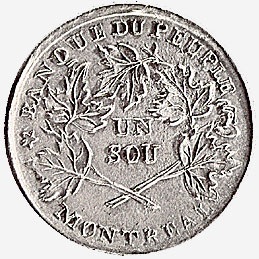French money vocabulary
French money vocabulary is confusing. I can never remember the word for change, let alone the French equivalents for concrete nouns such as coin and note, even though I carry these around in my wallet.
The word for money is argent, which is also the French word for silver. Supposedly the etymology is from when coins were made from silver.
A coin is called une pièce (pronounced PEE-ess), which is also the French word for piece.
A note is called un billet (pronounced BEE-yay), which is also the French word for ticket. So at the cinema, you can pay for your billet with a billet...
A dollar is just un dollar. The dollar coin in Canada is nicknamed a loonie, whereas the Quebecois call it a piastre (pronounced PEE-ast). You can see why I get confused. Pièce and piastre are virtually the same word.
And a cent is just un cent, which is also the word for 100. So it would be perfectly correct to say un dollar est égal à cent cents. Sometimes the Quebecois call it un sou for some reason. Coins called sous actual did exist apparently, in the 19th century.
Cash is called comptant, or argent comptant. It's a bit confusing because it looks like the verb compter (to count). I also get it confused with a counter, which is a guichet.
Finally the words for change and currency are the same: monnaie. This is a false friend because you'd think it would mean "money". I think this the most confusing of all.



Leave a comment